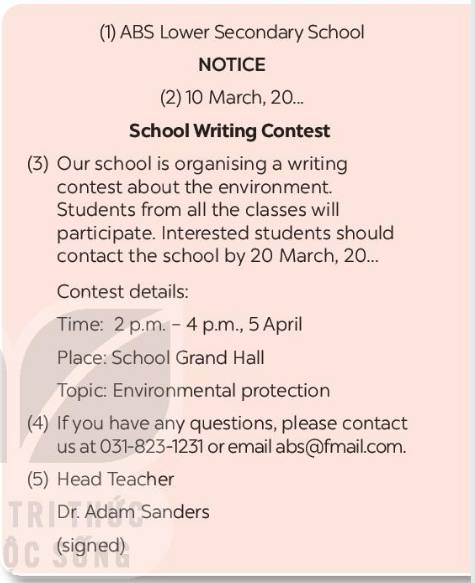Hãy nhập câu hỏi của bạn vào đây, nếu là tài khoản VIP, bạn sẽ được ưu tiên trả lời.

alter: thay đổi crops: cây trồng diseases: bệnh tật gene: gien
genetic: di truyền engineering: kỹ thuật herbicides: thuốc diệt cỏ
nutrients: chất dinh dưỡng weeds: cỏ dại
Did you know that scientists have put a fish (1) GENE into a tomato? They did it to develop tomatoes which can grow in cold temperatures.
So what are genes? Genes are instructions which exist inside every cell of every living thing. Each cell in the human body contains about 25,000 to 35,000 genes which determine your eye colour, how tall you are, what skills you have, and so on. So if you (2) ALTER a plant gene, you can change a specific characteristic like colour, shape or height.
(3) ENGINEERING changes the genes of plants or animals to make genetically modified organisms (GMOs). Scientists believe that GMOs can help us in many ways. For example, GM (4) GENETIC can produce more food which contains more (5) NUTRIENTS. They can also have an engineered resistance to insects and (6) DISEASES, and stay fresh for longer. GMOs can make fish grow larger and make cows produce healthier milk. Some people think that if we want to feed the world’s population, we will need GMOs.
But does genetic engineering work? Farmers use (7) HERBICIDES to kill weeds, but these chemicals can also damage crops. In the USA, farmers use GM crops which resist herbicides, so that they can destroy (8)WEEDS without damaging the crop. However, some ‘superweeds’ are becoming immune to the herbicides, so the farmers have to use more and more chemicals.
Food is very important to all of us and many people believe we are what we eat. These people are worried about the overuse of chemicals and the possible effects of eating GMOs. Some governments oppose them. What do you think?

Replace each italicized words with a synonymous one.
It is believed that our inherited (1) genetic characteristics play the decisive (2) role in our being beautiful, attractive and appealing to other individuals. Although there is no clear (3) theory on what beauty really is and how it works, the results of a recent scientific research (4) seem to confirm (5) the hypothesis that our facial features are determined (6) by our brains. Their possible role is to reflect (7) health and fertility as well as genetic superiority - the quality that people, supposedly (8), share with animals which, like humans, have their own sexual preferences. Most species of birds, for example, rely on the brightest colours of plumage when selecting (9) theirpartners (10). To them, the vivid shades (11) of the feathers indicate the potential partner's genetic fitness to produce healthy children (12).
In humans, similarly, beauty shows (13) our well-being and our sexual attractiveness, but as far as our facial characteristics are taken into account, peopletend (14) to regard as extremely charming (15) the faces with the highest degree of symmetry. And equally effectively, the facial properties may also indicate the appeal of the whole body.
1. a) indebted b) derivative c) innate d) acquisitive
2. a) vital b) functional c) tangible d) customary
3. a) eminent b) obscure c) indicative d) explicit
4. a) chore b) endeavour c) inquiry d) labour
5. a) bear out b) stand down c) prop up d) make about
6. a) reliant b) conditioned c) implied d) designated
7. a) manifest b) pertain c) survey d) uncover
8. a) plainly b) normally c) allegedly d) mainly
9. a) favouriting b) postulating c) referring d) asserting
10. a) counterparts b) mates c) fellows d) accomplices
11. a) dyes b) marvels c) twilights d) hues
12. a) stamina b) progeny c) entity d) forebears
13. a) affirms b) foresees c) displays d) envisages
14. a) incline b) aspire c) anticipate d) declare
15. a) flourishing b) starting c) captivating d) engrossing

1. the writer of the passage feels strongly that....
A. children should be involved in engineering activities at an early age
B. The mathematics and science courses in schools need to be modernized
C. University engineering courses ought to be upgraded
D. The education of pre-school children is being given too much important
2. The writer points out that children can, at a very early age
A. be encouraged to take part in after-school activities
B. develop an interested in scientific matters
C. make up their minds to study engineering at university
D. be influenced by their school environment
3. The writer recognizes the fact that engineering
A. is becoming less and less popular as a field of study among university students B. is only suitable for highly intelligent students
C. is a complicated subject only suitable for really mature students
D. has become one of the most popular fields of study at American universities
3. The writer recognizes the fact that engineering
A. is becoming less and less popular as a field of study among university students
B. is only suitable for highly intelligent students
C. is a complicated subject only suitable for really mature students
D. has become one of the most popular fields of study at American universities
4. Among the reasons given in the passage for the decline in the numbers of engineering students is that
A. the American schools still follow out - dated curricula curricula
B. university entrance requirements are far too demanding
C. many of them fail to acquire an adequate knowledge of mathematics and science at high schools.
D. it is generally recognized as one of the most difficult of all the courses
5. According to the passage, all school programmes.....
A. should be designed to make students aware of the engineering practices and principles
B. ought to give priority to sciences
C. must encourage children to make creative designs
D. Seem to put the emphasis on the need to diversify learning

Learning a language is, in some way, like (1) ____LEARNING_____ how to fly or play the piano. There (2) ______ARE______ important differences, but there is a very important similarity. It is this: learning how to do such things needs lots (3) _____OF______ practice. It is never simply to “know” something. You must be able to “do” things with what (4) ____YOU_______ know. For example, it is not enough simply to read a book on (5) _____HOW______ to fly an aeroplane. A (6) ______BOOK_____ can give you lots of information about how to fly, but if only read a book and then try to (7) _______FLY_____without a great deal of practice first, you will crash and kill (8) ______YOURSELF______ .The same is true of (9) _______PLAYING_____the piano. So you think it is enough simply to read about it? Can you play the piano without having lots of (10) _____PRACTICE_______ first?




1 - C. An example of genetic engineering
2 - D. Defining genes
3 - A. What genetic engineering can do
4 - E. Genetic engineering and weeds
5 - B. Doubts about genetic engineering